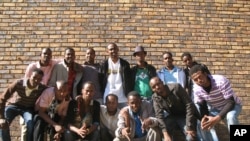A group of Somali friends who have fled their country have reassembled as a rhythm and blues and hip-hop band in South Africa. But even in their new country, where they are living as refugees, they also face threats to their lives.
Somali refugees clap, dance and practice a karaoke song in a tightly secured apartment building in Pretoria.
They are part of a group called the 11 Brothers. They initially grew from a soccer team in southern Somalia, and now they are 14 members.
They usually perform at local wedding ceremonies and other Somali diaspora events. A Somali friend who lives in the United States also sends them beats to make hip hop songs.
One song called The Motherland was a hit back in Somalia.
Band leader Abdoul Kadir, who fled Somalia by foot several years ago, explains the group's motivation.
"Mostly what we talk about is love, peace and we even talk about the problems back home in Somalia. We criticize these warlords and these extremists who are making Somalia worse than it was before like al-Shabab, which is not part of our culture. What they are doing is totally against our religion and our culture," Kadir said.
The song's popularity also led to email and phone threats against the 11 Brothers.
They say even though they fled Somalia, they still feel unsafe. And the threats do not just come from Somalia, but from South African gangs as well, who target immigrant market vendors.
In June, Kadir says the band's main sponsor, Brahman, was shot in the head and killed by a thief who stole his store money.
"He was the one who was helping us through financial help and everything. He was our elder brother I guess because most of us we are young. Some of us we are 25, 26. He was older than us but he was supporting us very hard. So it is a great loss to the group," Kadir said.
Previously, they say another band member was killed in similar circumstances, while another was killed in a bus crash.
Kadir gives a tour of a new shop group members have recently opened in a much safer neighborhood of Pretoria. The shop is also called 11 Brothers.
"We sell small products and groceries. This is our source of income as 11 Brothers because down there in the informal settlements it is very insecure. We feel a little bit safer here. We can make a business here," he said.
By pooling their resources and living frugally, the 11 Brothers say they can afford working and living in this more expensive area of Pretoria. It also has a big local mosque where they pray and a large Muslim population which shops at their store.
The 11 Brothers also find time to play soccer in their gated courtyard, the activity which initially brought them together back in Somalia.
Band member Hamza Mohammed, who is 25, says he accepts the plight of being a refugee as long as he can stay safe.
"You have to accept because you do not have a country. You do not have a government. You have to accept to be a refugee. We are not refusing that we are refugees. We are happy to be refugees, if we can get safe, if we can get a better life," Mohammed said.
Soccer has become their secondary activity now, as their game stops and quickly breaks out into more clapping and an impromptu song.
When Somalia becomes safer, the 11 Brothers say they hope they will have survived South Africa and will be able to return with some savings and a few more diaspora musical hits.
Somalia's '11 Brothers' Sing Refugee Rhythm and Blues




